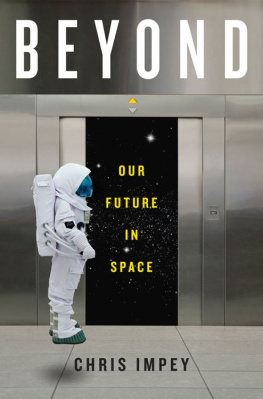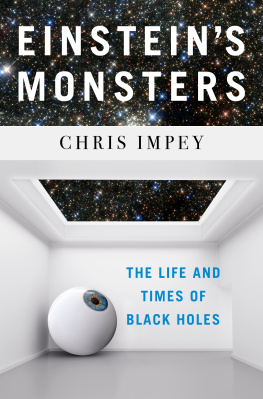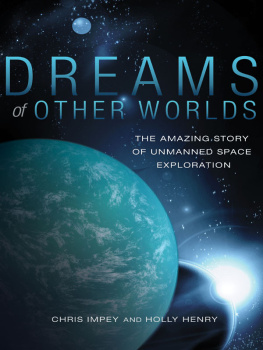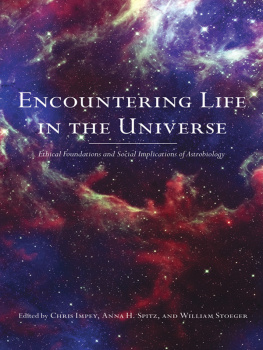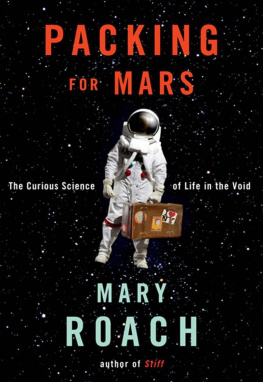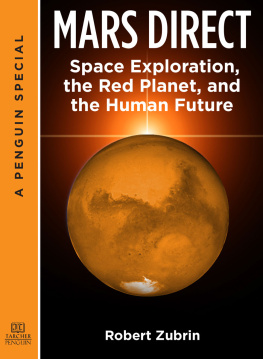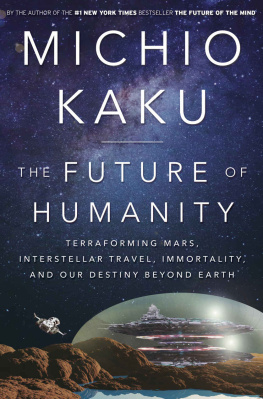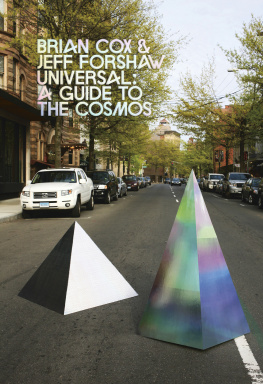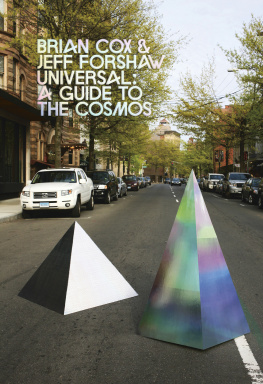

To the next generation of space pioneers,
who will realize their dreams to
live off-Earth.
CONTENTS
Space is inhuman. We cant survive unprotected in a pure vacuum for more than a minute. Going there involves being strapped to a barely controlled chemical explosion. Low Earth orbit is equivalent to half an hours drive straight up, but its insanely expensive to get there. The set of people who have experienced zero gravity is one of the most exclusive clubs in history. Yet space travel is an expression of a fundamental human trait: the desire to explore.
This book is an exploration of the past, present, and future of space travel. Were on the cusp of an important transition, where diverse technologies have matured to the point where space travel could be routine. A cadre of innovators and entrepreneurs is about to deliver space travel thats not just for astronauts and the super-rich. It will happen sooner than you think.
Each of the four parts of this book is preceded by a fictional vignette delivering us into the world of a young pioneer about to undertake a journey to the stars. First, we look at the Past to learn about our genetic proclivity for exploration and our progress with rocketry that let us leave the Earth for the first time in the mid-twentieth century. We also learn about the highs and the lows resulting from that landmark achievement. Then, in the Present, we see that the malaise of the space program will be cured by a new generation of entrepreneurs who are transforming our potential to leave the planet. We examine the legal and regulatory barriers that stand in their way and consider the dangers faced by space travelers. Peering into the Future, we look at how we can travel to the Moon and Mars, and we investigate the technologies needed to establish colonies there. We meet the robots that will be our partners in space and we visualize a time when off-Earth humans become a new species. Finally, we speculate Beyond our current capabilities to the time when we can travel to the stars and become citizens of the Milky Way. In a universe built for life, our yearning for cosmic companionship is strong, and we may never realize our full potential as a species if we stay Earthbound.
Im grateful to Anna Ghosh for stalwart support of my writing career, and Tom Mayer and Ryan Harrington at W. W. Norton for helping to forge a better book. Ive benefited from conversations with many colleagues over the years, but any errors or misstatements that remain are my responsibility alone. My deepest gratitude goes to Dinah Jasensky for her love and encouragement of all my writing endeavors.
I was four years old when I was chosen to be a Pilgrim. Too young to understand what that meant, I heard my mother try to describe it, but her words made no sense, so I fixated instead on the mixture of excitement and fear in her voice.
A few years later, the implications came into better focus. I suffered difficult years in a normal school, where I was alternately ostracized and bullied, ignored and humiliated, with a relentlessness seen only in children. To be a Pilgrim was an extraordinary honor but it marked me as different, as other. It was a relief when I was plucked from there at age eight and sent to a special school called the Academy, a school for my kind.
The Academy was in Switzerland, on a mountain lake that sparkled aquamarine in the sunlight, in a special compound where we were shielded from the media and prying eyes. There were nearly 300 of us, from more than fifty countries. We got one trip home every year but no family member could visit the school. Video chats with outsiders were limited to an hour each week. It may sound harsh, but it was for our own good.
We ranged in age from seven to twelve. I was one of the youngest. There were equal numbers of boys and girls. With so many cultures and languages represented, it could have been like Babel, so most of us wore our digital translators all the time. The curriculum was also polyglot. We studied everything from engineering and philosophy to medicine and fine arts. With as many tutors and counselors at the Academy as students, we had plenty of help. Expectations were high and there was a gentle but persistent pressure to excel. The staff was aloof, no doubt instructed not to form emotional bonds with us. Some of them were psychologists and psychiatrists who were clinical and often cold in their detachment.
I remember my dreams from that time.
Large shapes moving around in the darkness. An unrelenting pressure in my chest. A door sliding up, an inch from my face, like the lid of a coffin. A window, and beyond it, nothing, an absolute void. The images were both inchoate and sharply real. I would always wake with a start and sit up, bathed in sweat, my breathing fast and shallow.
On my mothers last visit before I left the Academy, a few months after I turned seventeen, she told me how my father died. I never knew the details when I was young, and information at the Academy was tightly controlled. He was on his second tour of a mining station on Phobos. His crew was deep in a shaft looking for inclusions of platinum and iridium. Miscommunication with the surface crew caused them to set off a charge nearby. Sofa-sized slabs of rock were ejected from the face of the shaft. At the center of a small asteroid theres no gravity, so no way to be crushed by falling rock as on Earth.
But Newtons laws have their own implacable logic. A large rock hit him squarely in the chest and carried him to the opposite wall, where its momentum was transmitted into his body, crushing and killing him instantly.
Thats probably part of why I was chosen. My father was a space rat and my sister an accomplished pilot; I had space in my genes. But at the Academy there were many kids with no predisposition to technical subjects; their parents were musicians or artists or diplomats. No two of us were alike. We seemed to form, as intended, a miniature world.
At my graduation, my mother and my sister were in the auditorium, and they grinned ear to ear when I waved to them. Later, as we shared a meal in the dining hall overlooking the lake, I flashed back to the way my mothers voice had sounded a decade earlier. Her excitement and fear had morphed into quiet pride tinged with sadness.
After graduation, we had two weeks to pack up and say our farewells. Visits and video chats were unlimited. I remember that it was emotionally exhausting to spend so much time with my family. Many of the other students felt the same way. We were young adults and had grown up without them, with only each other for sustenance. I felt relieved when the time came to travel to the launch site, though that relief was followed swiftly by a wave of guilt.
The time had come to learn what it meant to be a Pilgrim.
To be an emissary of Earth in the late twenty-first century. To be in a small group chosen for a unique experiment. The experiment was designed by sober scientists and engineers but it had the trappings of madness. We were human seedlings, charged with taking root in a new world.

_______________________
Out of Africa
When we were just one million strong, did we dream about what lay beyond?
Two hundred thousand years ago, anatomically modern humans first emerged in Northeast Africa. The cradle of our creation was the place now known as Ethiopia. Over the next hundred thousand years, these humans spread across Africa. Our distant ancestors kept no journals and, as far as we know, they had no written language. Only bones and scattered artifacts survive. Those artifacts speak of a rugged, doughty species that ceremonially buried their dead, hunted with sharpened flints made into spears and arrows, and daubed paint on cave walls to record the iconography of their lives. Their evocative images, which must have seemed kinetic in the flickering glow of an oil lamp or a fire, speak to us across the millennia of their fears and dreams.
Next page
